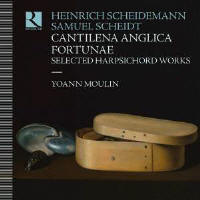Texte paru dans: / Appeared in: |
|
|
Appréciation d'ensemble / Overall evaluation :
|
|
|
Reviewer: Michael
Church
Heinrich Scheidemann and Samuel
Scheidt were composers who worked in Amsterdam in the early years of the 17th
century, and what united them was that they both studied there with the organist
Jan Pieterszoon Sweelinck. As Jerome Lejeune’s liner note explains, Sweelinck’s
organ improvisations in the Oude Kerk drew admirers from far and wide; the
attraction of his music lay in the fact that it combined influences from the
liturgies of the Catholic, Calvinist and Lutheran traditions, and dance styles
from all over Europe.
The musics of Scheidemann and
Scheidt sit so cosily together on this CD that they might have emanated from the
same brain. For harpsichordist Yoann Moulin, their music is both fascinating and
mysterious. ‘Emotion is formal and sentiment is architectural,’ he writes
gnomically, adding that its ‘disarming all-inclusiveness can echo within me with
a deep mysticism’. That may be overegging the pudding, given the routine quality
of the dances here, but other pieces possess a singular gravity and grace. Scheidt’s particular thing was sets of variations, in which he shows a ★oudini-like ability to pursue his line through a labyrinth of passagework; his variations on the theme of a Palestrina madrigal attain real splendour at their close. Scheidemann is a master of expressive simplicity, best demonstrated by his treatment of Dowland’s famous ‘Pavana Lachrymae’. Meanwhile Scheidt’s inventive imagination is fired by the English lute song ‘Fortune my foe’, another melody beautified by Dowland. Yoann Moulin’s instrument is a replica of an early 17th-century Rückers which has a warm and noble sound – words which could equally well describe Moulin’s playing.
| |
|
|
|
|
|
|
|
Cliquez l'un ou l'autre
bouton pour découvrir bien d'autres critiques de CD |
|



